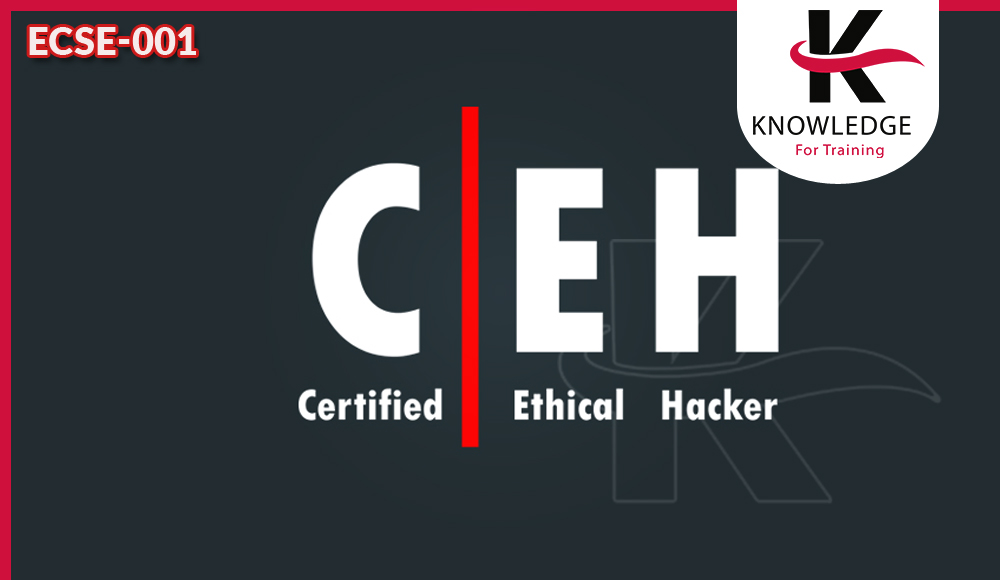-
Course Code
ECSE-001

Ethical Hacking and Countermeasures (CEH)
- Certified Ethical Hacker (CEH) is a skilled professional who understands and knows how to look for weaknesses and vulnerabilities in target systems. An Ethical Hacker uses the same knowledge and tools as a malicious hacker. The CEH credential certifies individuals in the specific network security discipline of Ethical Hacking from a vendor-neutral perspective.
- This ethical hacking course puts you in the driver’s seat of a hands-on environment with a systematic process. Here, you will be exposed to an entirely different way of achieving optimal information security posture in their organization; by hacking it! You will scan, test, hack and secure your own systems. You will be taught the five phases of ethical hacking and the ways to approach your target and succeed at breaking in every time! The five phases include Reconnaissance, Gaining Access, Enumeration, Maintaining Access, and covering your tracks.
Learning Outcomes
- Key issues plaguing the information security world, incident management process
- Various types of footprinting tools and countermeasures
- Network scanning techniques and scanning countermeasures
- Different types of Trojans, Trojan analysis, and Trojan countermeasures
- Working of viruses, virus analysis, computer worms, malware analysis procedure, and countermeasures
- Packet sniffing techniques and how to defend against sniffing
- Social Engineering techniques, identify theft, and social engineering countermeasures
- Session hijacking techniques and countermeasures
- SQL injection attacks and injection detection tools
- Wireless Encryption, wireless hacking methodology, wireless hacking tools, and Wi-Fi security tools
- Firewall, IDS and honeypot evasion techniques, evasion tools, and countermeasures.
- Various cloud computing concepts, threats, attacks, and security techniques and tools.
- Different types of cryptography ciphers, Public Key Infrastructure (PKI), cryptography attacks, and cryptanalysis tools
- Various types of penetration testing, security audit, vulnerability assessment, and penetration testing roadmap
- Perform vulnerability analysis to identify security loopholes in the target organization’s network, communication infrastructure, and end systems
- Different threats to IoT platforms and learn how to defend IoT devices securely
Course Contents
- Introduction to Ethical Hacking
- Footprinting and Reconnaissance
- Scanning Networks
- Enumeration
- Vulnerability Analysis
- System Hacking
- Malware Threats
- Sniffing
- Social Engineering
- Denial-of-Service
- Session Hijacking
- Evading IDS, Firewalls, and Honeypots
- Hacking Web Servers
- Hacking Web Applications
- SQL Injection
- Hacking Wireless Networks
- Hacking Mobile Platforms
- IoT Hacking
- Cloud Computing
- Cryptography
Our Methodology
- Make coaching and monitoring innovative and using modern
- Media training also using on the go training by using interactive means and focusing on
- The exercises, practical applications and real situations study
- Live delivery method, instructor-led training
- Experienced consultant, trainers, and professional
- Qualified trainer with high-level experience
Attendance Reports
- Send daily attendance reports to training departments
- Send full attendance report to training dep. by the end of the course
- Attend 100 % from the course days also provide daily
- Issue attendance certificate for participant who attend minimum 80% from the course duration
Pre/Post Reports
- Pre- assessment before starting training
- Post assessment after finish training
- Full report for the deferent between Pre-& Post assessment
Who Should Attend
- Security Officers
- Auditors
- Security Professionals
- Site Administrators
